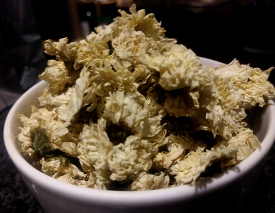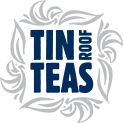White Chrysanthemum Iced Tea. Why?

White Chrysanthemum Iced Tea. Why? Mostly present in East Asia, chrysanthemum tea is quite popular in Chinese culture, especially when prepared iced during the hot summer months. In Chinese culture, the flower stands for respect and honesty, as well as integrity and nobility. The chrysanthemum flower is also known as Autumn flowers, because they remain during the winter and autumn months, in a time when other flowers wilt and die. These flowers remain medicinally effective/viable during the cold weather months.
There are a number of color shades, with regards to each variety of flower. The white varietal of chrysanthemum flower tends to be a bit sweet and produces heat. It has a direct passage to the liver and is beneficial for the eyes. It also aids in the treatment of headaches, dizziness, and blurred vision. This tea is very popular within the Anhui province.
Yellow chrysanthemum tea is helpful for detoxification and removing wind heat. This tea is also known to directly enter the lungs. It has been known to be helpful against colds and headaches, as well as itchiness and irritation of the eyes caused by certain infections. The tea has also been known to aid in acne, influenza, and circulation disorders like varicose veins and atherosclerosis.
TIDBIT: Due to the antibiotics present within the flower, chrysanthemum tea is quite beneficial against chest pain.
TIDBIT: When dealing with a cold, you should consume one cup of chrysanthemum tea every two hours.
TIDBIT: To aid in blood purification the supposed tea blend is chrysanthemum flowers, Ceylon cinnamon, ginseng and honey suckle flowers mixed together.
TIDBIT: Chrysanthemum helps in reducing the effect of hepatotoxicity, and protects the liver against damage.
TIDBIT: The flower contains high concentrations of Vitamin B, such as folacin and choline.
There are a few precautions whenever consuming chrysanthemum tea.
- You should avoid this herb, if you are taking medication for high blood pressure.
- If you have allergies to dandelion, daisies, sunflowers, or ragweed, this tea should be avoided.
- If you are diabetic and have to take insulin then this tea should be avoided.
- Medications for anti-inflammatory, anticancer, and antibacterial issues.
- Pregnant and nursing mothers should avoid this tea as well.
We have recently added this tea to our herbal line-up. If you are able to enjoy this tea, it I would highly recommend it. Its quite tasty iced with a little bit of honey.
See you at the shop.
Source: https://medlicker.com/876-chrysanthemum-tea-benefits-side-effects

